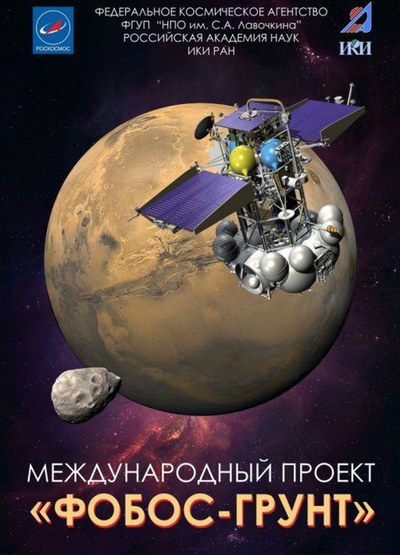Time for Russia to rethink its Mars exploration plansby Lou Friedman
|
| Do the Russians now have a Dan Goldin who can take failure and use it as a weapon to institute changes and vigor into a new planetary program? |
In the history of the Russian space program (nicely chronicled by Wes Huntress and Mikhail Marov; see “Review: Soviet Robots in the Solar System”, The Space Review, September 26, 2011) “try again” usually means that they will build approximately the same spacecraft fixing those things that might have caused their current problems and use it in another ambitious mission—perhaps even one with more complexity. I hope not.
Dwayne Day made a compelling case last week (see “Red Planet blues”, The Space Review, November 28, 2011) that the Russians need to radically reform their planetary program, instead of making incremental fixes. I agree. It is neither hubris nor chauvinism for us to say to our Russian colleagues, “it’s time to change.” We’ve been this way a couple of times in the American Mars program and, I think, learned the lesson. The failures of Mars Observer in 1993 and twin failures of Mars Climate Orbiter and Mars Polar Lander in 1999 resulted in big changes and, later, big successes.
Do the Russians now have a Dan Goldin who can take failure and use it as a weapon to institute changes and vigor into a new planetary program? Goldin, along with his associate administrator for science Wes Huntress, showed bold leadership in reacting to the loss of Mars Observer (the first US Mars mission in 16 years) by initiating a Mars program for flights in every two-year opportunity. Similarly, when the two 1998–99 missions were lost he personally took the blame and held up the plan to “try again” in 2001. What resulted was the brilliantly successful twin-rover MER mission in 2003 followed by the Phoenix polar lander in 2007, thanks also to strong NASA Headquarters leadership from Huntress and Ed Weiler. That is a marked difference from the lack of leadership in the Russian Space Agency. Russia needs someone in their space agency (not just in the science community) who cares about planetary exploration and not just about extracting payments as a contractor.
The Russians need to modernize and streamline their spacecraft with advanced electronics and software. But more so, they need to simplify their mission designs to increase probabilities of success. Phobos-Grunt was a kludge, with many things added to it that were not part of the basic mission. Indeed, the shift to a Zenit launcher in order to accommodate all the extra mass and consequent integration of the second stage into the spacecraft could have been a complicating factor contributing to the spacecraft failure to achieve the second stage firing.
Phobos-Grunt was not just a technical failure but also a program and system failure. However, now it can be an opportunity to make changes and commit to a new Mars program, unshackled from their 1970s approach and its legacy. If they do not seize the opportunity but keep doing business the same old way then it is unlikely they will be players in the solar system.
The failure also demonstrated again the need for international cooperation on large space missions. The mission suffered (as did Mars-96) because of the lack of Russian tracking assets. It was a scandal to repeat that type of easily correctible error. Mission planning was also compromised by not employing navigation assets from NASA and ESA. The failure also ought to convince Russia to join with the US and Europe (and potentially with Japan and China) in creating new missions of exploration.
The Russian Space Agency (Roscosmos) has the opportunity to make change and do things differently. They usually leave mission proposals to the Academy of Sciences, but Mars exploration is too big and too important to be left to the scientists. That only promotes infighting, and that in turn leads to the complex “bells-and-whistles” missions in order to accommodate everyone. Russia should give up that approach.
| NASA, ESA, and Roscosmos need to re-plan the future of Mars exploration. They should do it together. |
The current planning crisis in NASA’s and ESA’s Mars program also presents an opportunity. The two agencies recognized two years ago that Mars exploration was too big for any one country to do it alone. Russia needs to recognize it too. The major space agencies should convene a new special task force or coordination group to deal with Mars exploration and plan new missions from planet Earth, harnessing available resources for a combined effort for surface exploration by robots and later by humans. Such a task force could formulate and even design missions together. This could reinvigorate all three agencies and perhaps lead to a sorely needed focus for human space exploration as well.
The International Mars Exploration Working Group could, in principle, be that task force, although they have in recent years become little more than a social organization, with no mission definition responsibility. Only by creating an inter-agency structure for Mars exploration will new missions be advanced. This is the time to create that structure. Mars requires global effort: NASA and ESA have already recognized that and ESA’ s overture to Roscosmos, proposing a Russian launch of their 2016 Mars mission, is one more step in that direction. Next week there will be a trilateral meeting of the three agencies to discuss it. Russia should join and help enable international Mars missions in 2016 and 2018.
The US experience shows that failures can be opportunities. The successful launch of Mars Science Laboratory last week (congratulations to the NASA and JPL team) reminds us that great success can follow great failure. But it only happens with leaders willing to step out of their bureaucratic boxes. Does Russia have anyone willing to do so?
NASA, ESA, and Roscosmos need to re-plan the future of Mars exploration. They should do it together.
